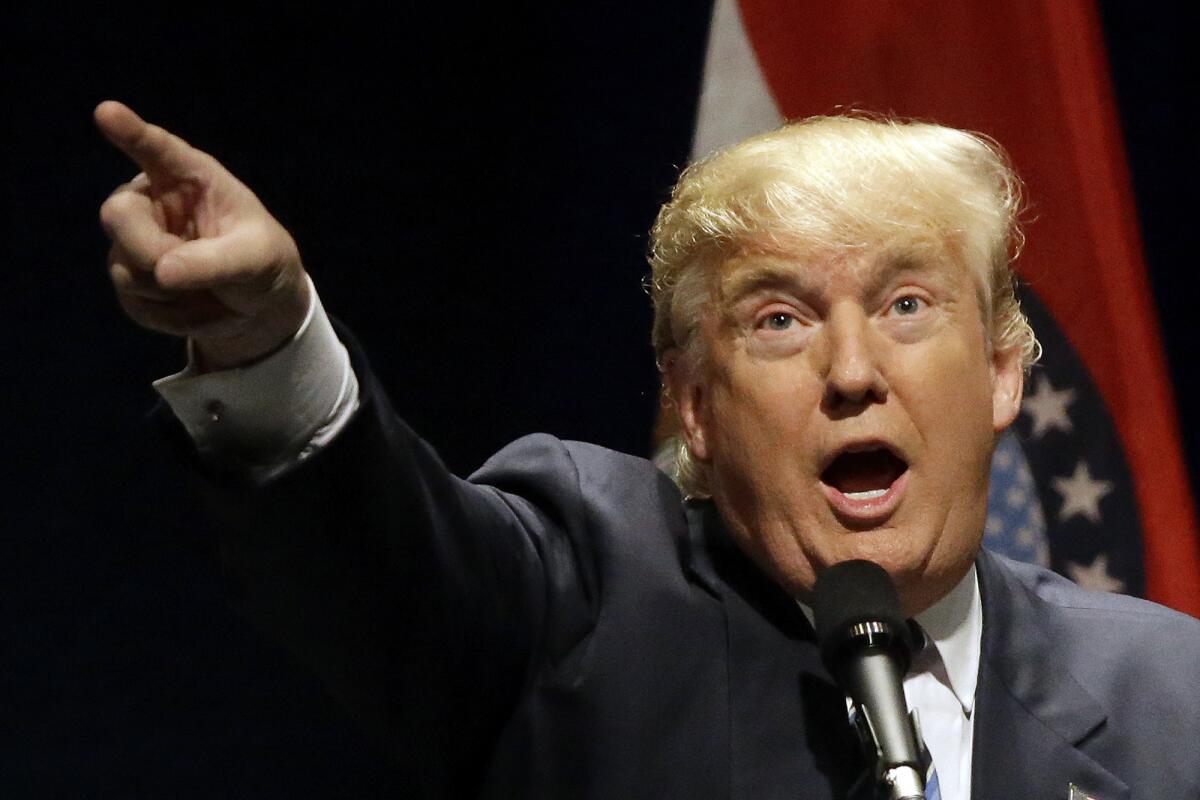Column: Donald Trump, the candidate of hope and change

Republican presidential candidate Donald Trump speaks during a campaign rally on March 11 in St. Louis.
I was in Florida last week, attending Donald Trump rallies and talking with the voters who love him. My question was straightforward: What’s the secret of the front-runner’s appeal?
Yes, Trump is attractive to voters who are angry — angry about the economy, illegal immigration and “political correctness.” And some of his supporters feel threatened by racial diversity, to put it mildly. But that’s only part of the answer.
What Trump’s supporters also hear from their champion is a message of unbridled optimism — a promise that he can repair the economy, bring jobs back and Make America Great Again.
Trump is running as a candidate of Hope and Change.
Just listen.
“We’re going to make our country rich again,” Trump promised last week in Palm Beach, Fla. “If I win … Apple and all of these great companies will be making their product in the United States, not in China.”
“We’re going to bring back all our jobs,” he told voters in Tampa. “We’re going to end up having great, great healthcare … for a fraction of the price.”
“Trust me,” he added. “I know about healthcare.”
And his over-the-top, all-purpose promise: “We’re going to win so much, you’re going to get tired of winning.”
Trump knows exactly what he’s doing. “Make America Great Again — that’s optimism,” he said last month. “Some people say, ‘Oh, such negativity.’ It’s just the opposite.”
The voters who put their faith in the real estate promoter seem to think Trump can fix almost anything, including the economy, healthcare, schools, veterans’ benefits, military strength and U.S. relations with Israel. Trump, they believe, will sweep all obstacles out of the way and impose simple answers on complex problems.
His supporters didn’t all fit the stereotype of the angry blue-collar voter either. Sure, some rallygoers scowled and muttered vulgarities when asked if they would talk with someone from the mainstream media. But others were talkative, cheerful and educated.
“Trump’s not a politician, he’s a businessman, and that’s what America needs,” Norm Holt, a genial retired firefighter from Largo, Fla., told me. “He can get more done than a politician can.”
“He’s whip-smart, he’s a leader,” said Tina Collier, a retiree from Arlington, Va. “He’s going to do things other people haven’t done.”
The idea that businesspeople are better qualified than politicians to run the country may be an illusion -- but Trump didn’t invent it.
“I’m just ready for change,” said Allison Polikoff, a middle school teacher from Plantation, Fla. “I think he can do a lot for education, too.”
Some of this sounds like simple frustration. If a generation’s worth of politicians hasn’t solved the country’s problems, maybe it’s simply time to give someone else a chance. Besides, as Ben Carson said last week, “We’re only looking at four years.”
But there’s also a dose of magical thinking born of the old American ideal of entrepreneur as all-purpose problem solver.
Trump isn’t the first businessman to offer his commercial prowess as proof that he can run the government.
Herbert Hoover campaigned for president in 1928 on his success as a mining engineer and executive. Data processing mogul H. Ross Perot ran as a third-party candidate in 1992 saying, “My strength is creating jobs and fixing things.”
And the Republicans’ last presidential nominee, in 2012, was a former venture capitalist who argued that business experience was a “basic qualification” for the presidency. That was Mitt Romney, who’s now trying to rally Republican opposition to Trump.
The idea that businesspeople are better qualified than politicians to run the country may be an illusion — but Trump didn’t invent it.
There’s a potential lesson here for anyone, Republican or Democrat, who hopes to keep Trump away from the White House.
His rivals in the GOP have been trying to dent his appeal by pointing out that he’s not a real conservative, that he’s needlessly divisive, and that he has a record of demeaning women. All true — but Trump supporters don’t seem to care.
Perhaps it would be more effective to argue that Trump isn’t the business genius he claims and that his proposed solutions are bogus. It would be better, in other words, to take on the validity of his optimism.
Most of Trump’s promises are an amalgam of nonsense and fantasy.
His plan for reviving manufacturing jobs is a 35% tariff on automobile imports; he never mentions that the cost would be paid by American consumers, even before the trade war that would ensue. His skimpy plan for “great, great healthcare” doesn’t add up either; nonpartisan analysts say it would insure fewer people and cost more money than Obamacare. And so on.
Romney tried his hand at bubble-popping earlier this month. “Donald Trump is a phony, a fraud,” he said on March 3. “His promises are as worthless as a degree from Trump University. He’s playing the American public for suckers.”
That’s the right message. Now it’s up to Ted Cruz and John Kasich, Hillary Clinton and Bernie Sanders to make it.
Because if Trump wins the presidency, even his most well-meaning supporters will soon discover that he’s a quack.
As Trump might put it: Sad!
Twitter: @doylemcmanus
Follow the Opinion section on Twitter @latimesopinion and Facebook
MORE OP-EDS:
History shows Trump’s ‘beautiful’ border wall would be worthless
The Zika virus doesn’t respect borders. It’s time for immediate U.S. action
More to Read
A cure for the common opinion
Get thought-provoking perspectives with our weekly newsletter.
You may occasionally receive promotional content from the Los Angeles Times.











